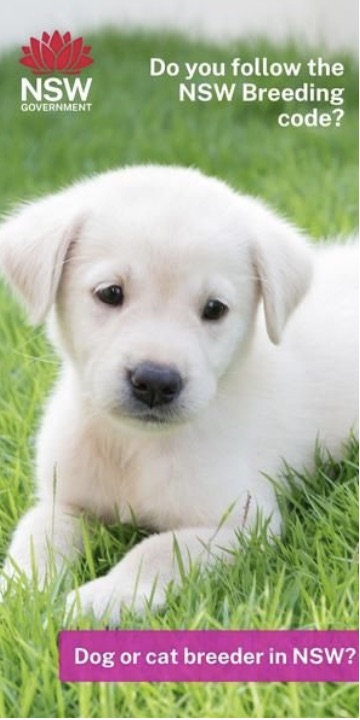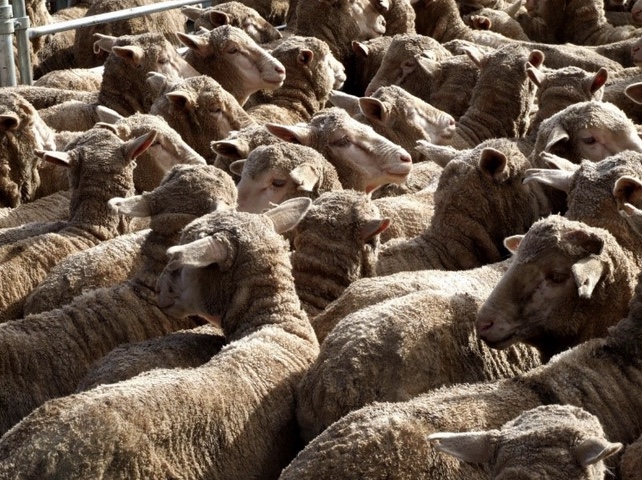
Veterinary animal welfare information
Veterinarians registered under the Veterinary Practice Act 2003 (veterinary practitioners) are a trusted source of information for animal owners and play an important role in helping to promote good animal welfare in NSW. There are many resources available that veterinary practitioners can use to assist their clients to implement good animal welfare practices.
For regular updates and news on animal welfare in NSW you can join the mailing list to receive the NSW Government’s Chief Animal Welfare Officer (CAWO) eNewsletters.
Companion animals – dogs and cats
 Do you have clients that breed dogs or cats? Research has shown that dog and cat breeders seek advice from their veterinary practitioner on animal welfare issues, and many breeders are unsure where else to look for information.
Do you have clients that breed dogs or cats? Research has shown that dog and cat breeders seek advice from their veterinary practitioner on animal welfare issues, and many breeders are unsure where else to look for information.
The welfare of dogs and cats in NSW is protected by legislation and supporting Codes and Standards. The NSW Breeding Code of Practice (the Code) applies to everyone that breeds dogs or cats in NSW for fee or reward. Additional information to help your clients understand how to protect animal welfare and comply with the requirements can be found here, including advertising rules and identification numbers, microchipping, registration and transfer of ownership.
From 1 December 2025, veterinary practitioners will play an important role in protecting the number of pregnancies and the types of birth a female dog may have in the dog’s lifetime. Specifically,
- Lifetime breeding cap: A dog is limited to a maximum delivery of 5 total litters or up to 3 caesarean litters, whichever comes first
- Written approval of a veterinary practitioner, namely a veterinary certificate, stating the pregnancy will not cause a significant risk to the health of the dog, must be obtained before a person can allow the dog to become pregnant after it has had 2 deliveries by caesarean.
- Within 14 days after a dog has given birth, a person must obtain and have available for inspection written records of all dog births, that specify the date of delivery, whether the delivery was by caesarean delivery or another method of delivery, and details of the veterinary practitioner and veterinary practice who delivered the caesarean delivery.
- Note: a caesarean delivery is where at least one offspring is born using a caesarean section operation.
A person breaching the lifetime breeding cap requirements for dogs may be subject to penalties which range from $11,000, for individuals and $55,000 for corporations breaching record keeping requirements; to a maximum of $110,000 or 2-years imprisonment or both for an individual, and $550,000 for a corporation for breaching the requirement of allowing the dog to become pregnant without the written approval of a veterinary practitioner where the dog has had 2 litters by caesarean delivery.
If you suspect or know a person may have breached these requirements, you can report this to a POCTAA enforcement agency. In NSW, these include RSPCA NSW, AWL NSW, NSW Police, and the Greyhound Welfare Integrity Commission. You can find more information about POCTAA enforcement agencies on the department’s webpage here.
Reporting the issue helps keep breeders accountable and assists in the prevention of illegal or unethical breeding practices.
Buying or adopting a cat or dog
Information for anyone thinking of buying or adopting a cat or dog, including top tips, questions to ask before making a purchase and how to spot a puppy factory or scam can be found here. This handy checklist for purchasing a puppy or kitten helps buyers ensure they have considered all the aspects involved before purchasing their new pet.
The NSW Pet Registry, managed by the NSW Office of Local Government, is a database of registered cats and dogs that live in NSW. More information for veterinarian practitioners on this website is available here. The Registry is part of the NSW Government’s commitment to strengthen animal welfare standards and promote responsible pet ownership across the State.
Livestock
 The welfare of livestock animals in NSW is protected by legislation and supporting Codes and Standards. The details can be found on the Animal Welfare webpages with specific information for cattle, sheep & goats, pigs, poultry and other species. Veterinary practitioners play an important role in identifying welfare risks or issues, and working with producers to help improve animal welfare in stock animals.
The welfare of livestock animals in NSW is protected by legislation and supporting Codes and Standards. The details can be found on the Animal Welfare webpages with specific information for cattle, sheep & goats, pigs, poultry and other species. Veterinary practitioners play an important role in identifying welfare risks or issues, and working with producers to help improve animal welfare in stock animals.
Stock Welfare Panels (SWP)
Stock Welfare Panels can be established by the department when animals are identified to be at significant risk. Stock welfare panels seek to improve the animal welfare outcomes for the stock through a structured process, and involve a panel of experts with representatives from an enforcement agency, Local Land Services (LLS), NSW DPIRD, and usually a NSW Farmers’ representative. At least one member of a SWP must be a veterinary practitioner.
To learn more about stock welfare in NSW you can find information here. There is also a video that explains the Stock Welfare Panel process.
Reptiles
More information to come.

